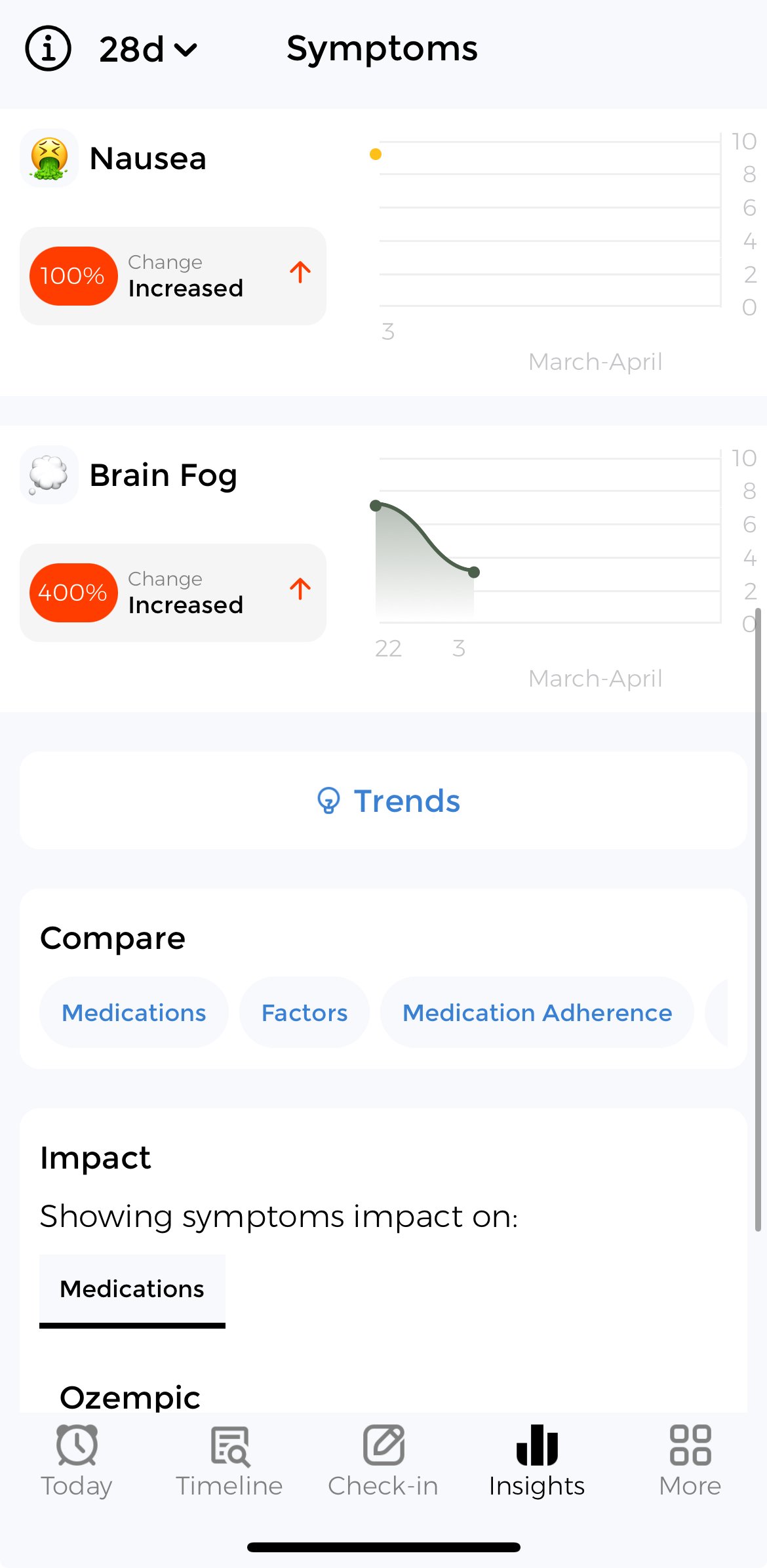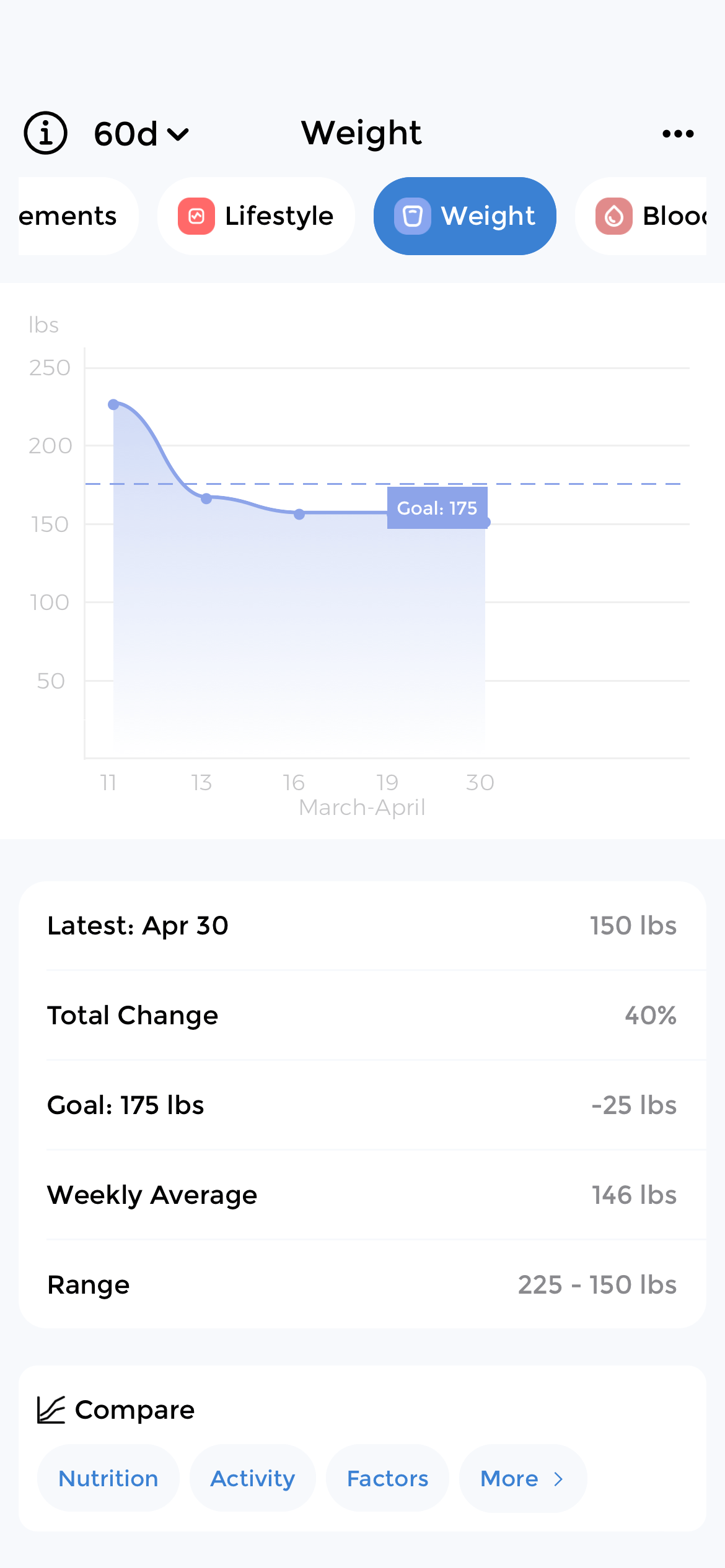Best Health Diary App & Medical Journal App for Daily Health Tracking
Transform your personal health journal into actionable insights. CareClinic’s medical diary app helps track symptoms, medications, and daily health logs in one powerful health tracking journal app. The best health journal app trusted by 500,000+ patients worldwide.
Start Your Free Health Journal App
4.7/5 App Rating
500K+ Active Users

Why Try CareClinic As Your Medical Diary App
Smart Daily Health Log with AI Analytics
Unlike basic health diary apps or simple medical log book apps, our AI-powered health journal app free version identifies patterns between symptoms, medications, diet, and lifestyle. Transform your daily medical journal into breakthrough insights with the most advanced health diary application available. Results start showing in just 7 days.
Health Diary App For iOS & Android
Access your medical diary for patients anywhere. Whether you need a health journal app ios, health record app android, or web-based daily health diary app, your medical records sync instantly. Works as a health record app on iPhone and medical journal app for android seamlessly. Setup takes under 2 minutes.
Medical Records with Doctor Reports
Generate professional health record reports from your personal health journal app. Give healthcare providers real data from your digital health journal app to improve diagnosis. The best medical records app for patients and doctors. One click creates a complete health summary.
Why You Need More Than a Basic Medical Diary Application
Problems with Basic Tracking
Paper Health Diary Templates
Traditional medical diary book and health journal templates get lost, can’t analyze patterns, lack healthcare calendar app features, and offer no medication reminders. You need a digital health diary app that actually helps.
Basic Health Log Apps
Simple daily health log tools and basic medical log book apps track single metrics but miss correlations. No mental health diary app features, food diary app for gut health integration, or comprehensive health tracking capabilities.
Generic Diary Apps
Regular diary app for iPad or iPhone lack medical journal app features like symptom severity tracking, medication logs, or health record application capabilities. Is there a food diary app with real health tracking? Most apps fall short.
CareClinic Health Diary Solution
✓ Complete health tracking journal app
Combining medical diary, mental health journal app free, food and health diary app, and gut health diary app features in one powerful platform
✓ AI-powered daily medical diary app
Identifies patterns your doctor needs. The best health diary app with correlation analysis that turns data into insights
✓ Medical records app free with reports
Professional health summaries. The top medical journal app for patients and providers with export capabilities
✓ Healthcare calendar app integration
Smart reminders for medications, appointments, and medical diary entries to keep you on track
✓ Apple health journal & Android sync
Health record app android compatibility with all wearables and devices for complete tracking



Start Your Digital Health Journal in 3 Simple Steps
Download the Best Health Diary App Free
Get the health journal app for iPhone or medical diary app android version. Choose from health diary templates for diabetes, mental health diary app free tracking, women’s health diary 2025 features, or create a custom daily health log. Works as medm health diary app alternative. Takes less than 30 seconds to download.
Track Your Daily Medical Journal Entries
Log symptoms, medications, mood in your personal health journal apple watch compatible app. Set reminders for your medical diary app free updates. Track as a mental health diary app, food health journal app, or medicine diary app. All in one health diary application. Most users log in under 60 seconds.
Get Journaling Ideas & Insights
View AI reports from your health tracking journal app. Export medical records app data for appointments. Discover patterns in your daily health diary app that your medical journal app iphone tracks automatically. See your first insights within 7 days of tracking.
Journal Features
These are just the highlights of what makes CareClinic the most complete health diary app available. Beyond these core features, you’ll discover dozens more tools designed to make health tracking effortless. Everything works together seamlessly, so you can focus on feeling better, not figuring out complicated apps.
Health Tracking Features
Track symptoms, pain, mood, and energy levels in your comprehensive medical diary. Perfect for chronic illness management or general wellness optimization.
- 100+ symptom types with severity scales
- Body location mapping for pain tracking
- Mood & mental state monitoring
- Energy & fatigue level tracking
- Custom symptom creation
Medication Management
Never miss doses with smart reminders. Track effectiveness and side effects in your personal health record. Simple enough for anyone to use.
- Smart medication reminders
- Refill alerts before running out
- Drug interaction warnings
- Adherence tracking & reports
- Side effect monitoring
Nutrition & Diet Tracking
Log meals, identify food triggers, and track digestive health in one integrated platform. See connections between food and symptoms in days.
- Food database with barcode scanning
- Allergy & intolerance tracking
- Symptom-food correlation analysis
- Nutritional insights & patterns
- Hydration monitoring
Medical Records & Analytics
Store test results, vitals, and medical history. Get AI-powered insights from your health data that even doctors miss.
- Blood pressure & heart rate tracking
- Blood glucose monitoring
- Lab result storage & trends
- Medical imaging organization
- Wearable device integration
Healthcare Calendar
Manage appointments, treatments, and care schedules in one unified healthcare calendar. Never miss important health events again.
- Appointment scheduling & reminders
- Provider contact management
- Treatment timeline visualization
- Procedure & surgery tracking
- Follow-up care management
Security & Privacy
Your health data is protected with bank-level security and complete privacy control. Sleep easy knowing your information is safe.
- 256-bit AES encryption
- HIPAA & GDPR compliant
- Biometric authentication
- Local data storage option
- Secure cloud backup
Who Uses CareClinic’s Health Journal App
We get it. You’re tired of feeling like your health is out of control. Whether you’re managing a chronic condition, trying to optimize your wellness, or supporting a loved one’s health journey, you need more than just another app. You need a health companion that actually understands. CareClinic isn’t just for the conditions listed below. It’s for ANYONE who refuses to accept “just living with it” as an answer. From rare conditions to everyday wellness, if you can track it, we can help you understand it.
What Our Users Report
CareClinic vs Other Health Diary Apps
Most health apps track single metrics while missing the bigger picture. CareClinic connects all your health data to reveal hidden patterns and correlations. See real improvements in days, not months, with insights that actually help you feel better.
| Features That Actually Matter | CareClinic App | Basic Health Apps | Paper Medical Diary |
|---|---|---|---|
| Track Everything in One Place Stop juggling multiple apps |
|||
| Find Hidden Health Patterns AI discovers what you miss |
|||
| Share Reports with Doctors Get better care faster |
|||
| Works on All Your Devices iPhone, Android, Web, Wearables |
|||
| Never Forget Medications Smart reminders save lives |
|||
| Track Mental & Physical Health Your whole health matters |
|||
| Identify Food Triggers Finally solve gut issues |
|||
| Free Forever Option No credit card required |
N/A |
Medical Professionals & Patients Love Our Health Diary
App FAQs
Yes! CareClinic offers a health journal app free version with core daily health log features. It’s a medical diary app free with premium upgrades for advanced health tracking journal app analytics. You can use it forever without paying.
CareClinic combines symptom tracking, medication management, mood monitoring, nutrition logging, and medical records in one app. Our AI correlation engine finds patterns between all these factors that simpler apps miss. Plus, we generate professional reports for doctors.
Absolutely! Our health record app generates professional reports from your personal health journal. Doctors recommend CareClinic as the best medical diary app and medical records app for patients tracking between visits. Export PDFs or share digitally.
Yes. This health journal app uses 256-bit AES encryption (bank-level) and is HIPAA compliant. Your medical records app data is never sold or shared. We offer both cloud sync and local-only storage options for maximum privacy control.
Yes! CareClinic works as a complete mental health diary app with mood tracking, medication logs, therapy notes, and trigger identification. It’s the best mental health journal app free with professional features therapists recommend.
Yes! Track meals, symptoms, and reactions in our gut health diary app. Perfect food diary app for IBS, food intolerances, allergies, and digestive health. Our AI helps identify trigger foods and patterns you might miss.
Available as health diary app iPhone (iOS 12+), medical diary app android (5.0+), web app, and Apple Watch. Syncs with Apple Health, Google Fit, Fitbit, and 20+ other health devices. One account works everywhere.
Set custom reminders for each medication with flexible scheduling (daily, weekly, as-needed). Get notifications on your phone, smartwatch, or email. Track adherence, refills, and effectiveness. Never miss a dose again.
Yes! Create separate profiles for family members on one device. Each profile is password-protected with completely separate data. Perfect for caregivers managing multiple people’s health or families sharing a tablet.
Our AI analyzes all your logged data: symptoms, medications, food, sleep, activities, weather, and more. It identifies correlations you might miss, like “migraines increase 2 days after eating aged cheese” or “anxiety improves with morning walks.”
No problem! Set custom reminders to log entries. You can also backdate entries with no time limit. Many users log once daily before bed. The app learns your patterns and suggests common entries to save time.
Yes! Export your data as PDF reports or CSV files. Print summaries for doctor visits or insurance. Create custom date ranges and choose which data to include. Your data is always yours to access.
Yes! CareClinic offers large text options, voice input, simplified interfaces, and caregiver access. Many seniors and their families use it for medication management, appointment tracking, and health monitoring. Easy enough for any age.
No! The app works offline on your device. Your entries are saved locally and sync when you reconnect. Perfect for travel or areas with poor connectivity. Premium features like AI insights require internet.
Those apps focus on fitness metrics. CareClinic is a medical diary app designed for health conditions, symptoms, medications, and medical care. We integrate with Apple Health and Google Fit but add crucial medical tracking they lack.
Only if you explicitly share it. You control all access through secure sharing links or printed reports. Some clinics use CareClinic’s provider portal (with your permission) for better care coordination. Your privacy is always protected.
All conditions benefit! Especially effective for: chronic pain, diabetes, hypertension, mental health, autoimmune conditions, migraines, IBS/gut issues, sleep disorders, and post-surgery recovery. If you can track it, we can help analyze it.
Stop Guessing.
Start Understanding Your Health.
Every symptom tells a story. Every medication has an impact. Every meal affects your body. CareClinic connects these dots so you don’t have to. Join 500,000+ people who finally understand their health patterns. It’s easier than you think, and results come faster than you’d expect.
Your Data Stays Private
You Own Your Data


